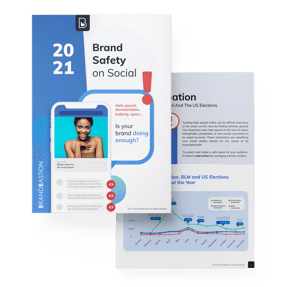
Brand Safety in 2021: Trends, Trials, and Tribulations
Online content consumption is at an all-time high, which is great for your brand, right?
As marketers, it’s crucial to make informed decisions that protect your brand’s reputation. However, in the current climate where cancel culture is commonplace, extremist content is running rampant on the internet, and fake news is the ‘new norm,’ decision-making has become particularly difficult, and it's likely that your brand’s safety has been put at risk.
On January 6th, 2021, the US Capitol was breached by an angry mob of Trump supporters who vandalized congressional offices, shattered windows, and destroyed property. Due to the immediacy social media provides, the world was watching in real-time.
In the following days, to show respect, dodge controversy, and protect one’s image, reputation, and safety, many brands chose to pull tv commercials and pause paid social advertising. These business decisions demonstrate why and how brand safety has become such an urgent topic of discussion.
In 2021, marketers need to have a pulse on every aspect of each marketing campaign, from which apps and sites your ads will be displayed on to the content surrounding your ads. Today, content matters, ad placement matters, social communities matter, social activism matters, and brands will therefore need to become well-versed in brand safety.
What is brand safety?
Brand safety refers to the efforts and guidelines aimed to protect a brand’s image, reputation, and return on investment. The term ‘brand safety’ can be considered general in nature, as it is applied differently by different brands. For example, what a children's brand may deem vulgar speech, a gaming brand may deem freedom of speech. No matter the specifications, brand safety guidelines and procedures are put in place to protect a brand’s image and maintain positive consumer perception in the long-term.
Brand safety trends in 2021
It’s time to protect your brand, and it must happen from within the roots of your businesses all the way through to the stems of each campaign's life cycle.
1) Know your audience, know your values.
According to Eldeman’s 2021 Trust Barometer, 86% of people expect CEOs to speak about societal issues publicly.
In 2020, society as a whole turned to our governments to tackle life-changing and life-threatening issues, such as the global health pandemic, a shift in power in the United States, and a grassroots-turned-global movement regarding race relations. The consensus is that in most cases, our governments failed us. Therefore, people have turned towards businesses like yours to step in and address controversial political, economic, and social issues. Consumers are demanding that brands weigh in on and lead conversations regarding the aforementioned topics.
The difficulty lies in developing the expertise to tackle these discussions appropriately. Speaking on society’s woes and worries is equally important as understanding the weight of your words. In 2021, a tone-deaf campaign will define your business.
Representation and education in the workplace are crucial to ensuring your brand has the knowledge, expertise, and know-how to speak on pressing societal issues. Evaluate your brand’s audience and ensure that your workforce represents and/or is educated on the audience you are speaking to. Hiring people from diverse backgrounds will increase creativity and collaboration, while driving better insights and decisions.
2) Understand the 360° impact of ad placement
Two-thirds of the UK’s top 100 advertisers were exposed to potentially unsafe brand environments
In an ultra-sensitive world, be ultra-aware of where exactly your ads are appearing and what content is surrounding them. New measures should be taken to avoid having your ads appear next to harmful content in the form of extremism, fake news, sexually inappropriate content, and/or violence and weapons, as studies have shown that the current measures are not sufficient.
A deep dive into ad placement
News has always been divisive in marketing, and one could argue it’s only become more divisive in 2020 as a result of the global health pandemic and the US elections. However, people have turned to online news outlets significantly more for information because of these news-worthy events. In 2020 alone, many news outlets have doubled their news consumption, posing the question as to whether or not brands should reconsider the weight of the news’ divisiveness.
Thanks to Facebook and Google Ad’s new brand safety measures, your teams will be allowed control over where your ads are placed and what content is surrounding your ads. In the near future, you will be able to exclude content that is not brand-suitable on Google Ads and customize content allow lists on Facebook Ads. Read more about how to avoid common mistakes when planning a campaign with ads here.
For example, your brand might choose not to advertise on news stories related to Covid-19 deaths and conspiracy theories. However, your brand might be more apt to advertise near content related to the vaccine and social distancing measures. Why? Because more than ever, people are flocking to the news, meaning there are great opportunities to reach large audiences. In the future of advertising, marketers will no longer need to halt advertisements on reputable news outlets as a whole. Instead, your teams will choose content that is suitable to surround your brand’s advertisements, thus avoiding negative brand associations while still reaching wide audiences.
3) Track comments and conversations in your comment sections
Even in the midst of these advancements regarding ad placement, be aware that the comment section on social is adjacent to your ads, having as much - if not more - impact on brand safety. The effort required to manage massive amounts of comments on ads tends to become humanly unmanageable for even the best in-house teams, but it should not be overlooked.
What types of comments might impact brand safety?
| Types of Comments | Brand Safety Impact |
| Discriminatory, extremist, or hateful comments | Puts brand community in danger, establishes negative brand associations |
| Competitor mentions | Decreases number of overall purchases, hinders brand reputation and return on ad spend |
| Broken link or typo | Loss of brand credibility and trust |
| Threats | Puts brand community in danger, establishes negative brand associations, hinders brand reputation |
| Spikes in negative sentiment | Hinders brand reputation and return on ad spend, shows your content is not resonating |
| Profanity | Hinders brand reputation and establishes negative brand associations |
| Scam | Loss of brand credibility and trust, puts your community in danger of attacks |
BrandBastion’s Moderation and Alerts solution keeps your brand protected by alerting your teams based on situations activated, such as the threatening comments mentioned above. BrandBastion’s solutions provide your brand the reassurance that when a problem arises, you will be notified and you will have the opportunity to solve it and speak on it.
In 2021, sentiment analysis tools have advanced to the extent that they can understand the context of conversations. BrandBastion, for example, has a highly accurate sentiment and topic classification using classifiers trained on vast amounts of social media native content to consider context, tone of voice, and emojis, among many other factors. This is essential to understand how your target audience is perceiving your branding campaigns.
The future of brand safety
There’s no one shoe-size-fits-all solution to brand safety, which might explain why companies like Bank of America have hired Brand Safety Officers. One can only see so far into the future; consumer expectations are changing, how we collect and use data is changing, and how we engage with our social communities is changing. If 2020 has taught us anything, it’s that the future is unpredictable, and we need to be prepared to act and react.
If you would like more information on the topic, Download Our Brand Safety eBook